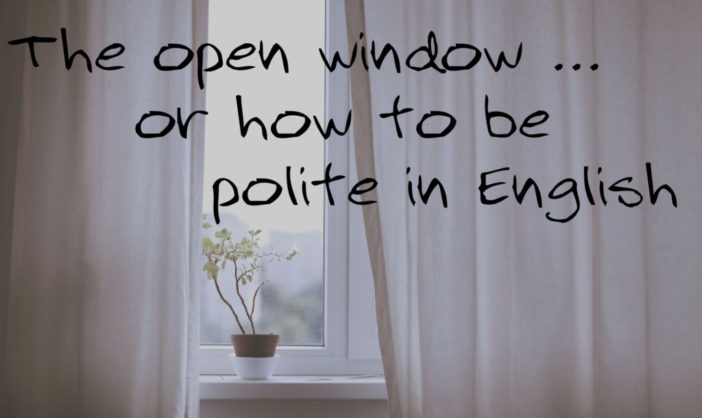The open window … or how to be polite in English
When I was working on my graduate degree in teaching ESL, one of my favorite subjects was pragmatics. According to my linguistics book, one of those rare textbooks that is both fascinating and fun to read, pragmatics concerns “how speaker intention and hearer interpretation affect meaning.” In other words, there’s often a hidden meaning behind what we say (or don’t say) that may be picked up, missed, or misinterpreted by our listener. Many times we say exactly what we mean (with what linguists call a direct speech act); however, when we use indirect (or sometimes no) speech, we are still communicating.
Picture this scene. You are sitting in your apartment with your roommate watching TV. Suddenly, without saying anything, he gets up and opens the window. It’s cold outside and pretty soon the room is too cold for you. Your roommate doesn’t seem to notice.
What do you think about this?
I think most people would say that this is fairly rude of your roommate. He opened the window without consulting you about the temperature of the room. So what kind of indirect speech acts could your roommate have made before opening the window?
What if before opening the window he said:
This room is too hot!
I’m hot!
You would probably think this is still pretty rude. Your roommate stated the reason for opening the window, but didn’t consult you on whether this was a good idea. The hidden meaning behind these words could be interpreted, “I’m uncomfortable and I’m going to open the window. Whether you are hot or not really isn’t important.”
What if just before opening the window he said:
It’s too hot in here … let’s open the window!
Most people would say this is only marginally less rude. Although at least he recognized you, nominally, as one of the occupants of the room, he didn’t wait for your agreement. The hidden meaning is, “I’m uncomfortable and want to open the window. I realize you’re in the room as well, but I don’t really care what you think; I want the window open.”
So how would we handle this situation more politely in English?
To make sense of this, consider the theory of Brown and Levinson, who proposed a concept of face to explain politeness. Every listener has a face … or actually, two faces. The positive face is the listener’s desire to be liked, approved, and appreciated; the negative face is the listener’s wish not to be imposed upon, inconvenienced, or bothered. Polite speech acts can appeal to the positive or negative face of the listener.
In the case of the open window, your roommate should realize that making the room colder might cause an imposition on you; maybe you don’t want it colder. Thus, he needs to appeal to your negative face using a variety of strategies, often combined together.
Indirectness
It seems so hot in here. It might feel better if the window was open.
Hedges (using words like maybe, perhaps, might, may)
I’m kind of hot. Do you think maybe we could open the window for awhile?
Questions
Would it be okay with you if I opened the window?
Pessimism (not expecting agreement)
I don’t suppose you’d like to have the window open, would you?
Minimizing the imposition
Would you mind if I open the window for a minute or two? I’ll shut it if you get cold.
Apology
I’m sorry. I don’t know why I’m so hot right now. Would you be okay if I opened the window?
Plural pronouns
Gosh, I’m getting really hot. Are you? How about if we open the window for a couple of minutes?
In general, English learners will want to focus on negative politeness because, above everything, they want to avoid being seen as rude. Positive politeness expresses friendship, support, appreciation, and solidarity … and I think if you’re a genuinely friendly person, you’ll be able to make that understood to the people you are close to. But negative politeness is important when you’re dealing with strangers, superiors, or people you don’t know well. The strategies given above, combined with the all-important please when asking for any sort of favor and excuse me when trying to get someone’s attention, should help you to handle most of these situation with aplomb.
Because saying the wrong thing or being viewed as rude or impolite can have such serious consequences, I think it’s really helpful to work with an English teacher who belongs to the culture in which you want to fit in. A good teacher can walk you through various situations and help you feel more comfortable about the right words to say to not only avoid being rude, but to make a positive impression on the people you encounter.




